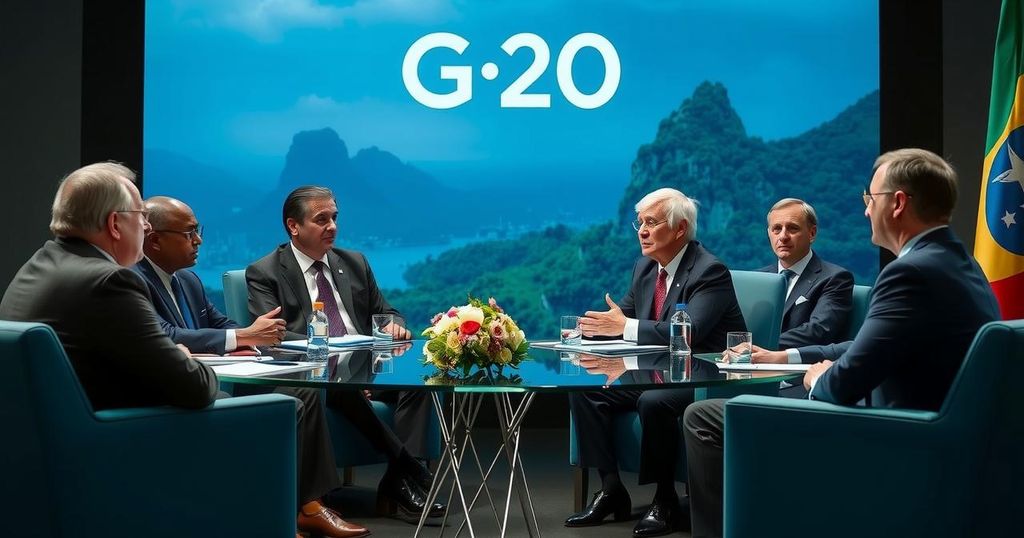Leaders of G-20 nations gathered in Rio de Janeiro to focus on sustainable development and climate change, calling for significant increases in climate financing. With the world on track for unprecedented warming, the leaders emphasized the urgency of a new financial commitment aimed at assisting poorer nations. Tensions arose over who should contribute, as the summit also acknowledged the necessity of addressing plastic pollution through a legally binding treaty by 2024.
On the final day of the G-20 summit in Rio de Janeiro, leaders from the world’s major economies converged to discuss sustainable development and the urgent transition towards cleaner energy. The meeting aimed to bolster efforts to combat global warming ahead of the crucial U.N. climate talks in Azerbaijan, amidst rising concerns over climate change as the world heads towards its hottest year on record. In light of these challenges, the G-20 leaders issued a joint statement emphasizing the need to significantly boost climate finance, aiming to escalate funding from billions to trillions. The statement underscored the necessity for negotiators at COP29 to establish a new financial commitment that entails a substantial contribution from developed nations to assist poorer countries facing climate-related hardships. This is particularly critical given that economists estimate a target of at least $1 trillion per year to address climate change comprehensively. There is ongoing tension regarding who should shoulder the financial burden, with wealthier nations advocating for the inclusion of affluent developing countries like China in the funding framework. Developing nations, including Brazil, have opposed this notion, asserting that historically, developed countries have been primarily responsible for the emissions causing climate change. Although discussions included proposals for voluntary contributions from developing nations, such provisions were ultimately not incorporated into the concluding agreement. With a view to creating a significant impact, President Luiz Inacio Lula da Silva of Brazil highlighted the urgency of addressing climate change, stating that its effects are evident globally. The G-20 countries, encompassing 85% of the global economy and producing over three-quarters of carbon emissions, are pivotal in shaping global climate responses. Furthermore, the leaders affirmed their commitment to pursuing a legally binding treaty aimed at reducing plastic pollution by the end of 2024, with discussions set to resume shortly to finalize this initiative.
The G-20 is a key international forum that encompasses 19 countries and the European Union, representing the world’s major economies. These nations collectively hold significant sway over the global economy and the majority of climate-damaging emissions. The summit in Rio de Janeiro focused on sustainable development and addressed the pressing issue of climate change, notably in light of the upcoming COP29 climate talks in Azerbaijan. The meeting is characterized by debates on how developed nations should provide financial support to developing countries while balancing the need for broader contributions from wealthier developing nations. The context of rising temperatures and the potential return of a climate-skeptical U.S. administration have intensified the urgency of these discussions.
The G-20 summit in Rio de Janeiro concluded with a strong emphasis on addressing climate change through increased financial commitments and a call for global cooperation among nations. Leaders acknowledged the necessity to enhance climate finance expeditiously, with an understanding of the substantial contributions required from developed countries to assist their developing counterparts. Although consensus remains challenging regarding the obligation of affluent developing nations, the summit’s outcomes depict a burgeoning commitment towards achieving sustainable development and combating climate change effectively.
Original Source: www.straitstimes.com






